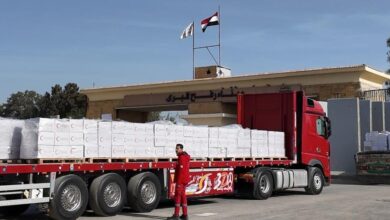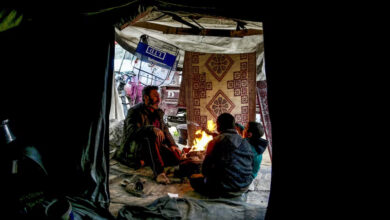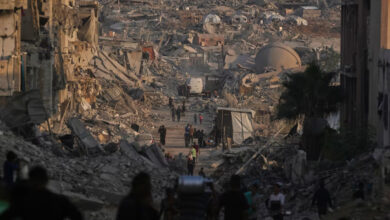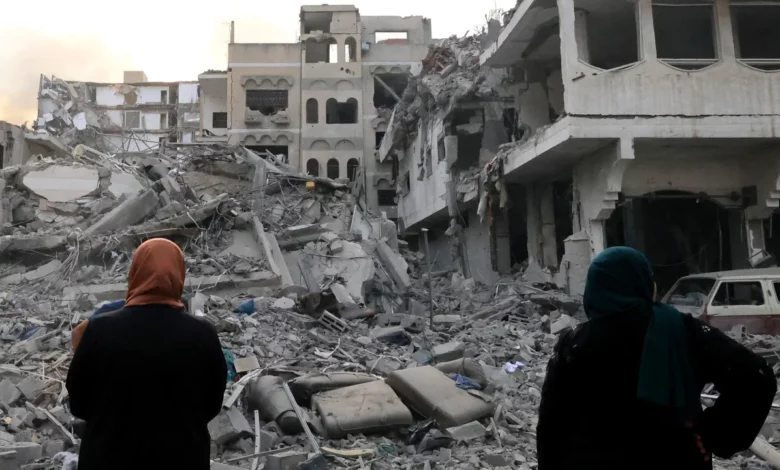
Eight months pregnant and worried about her unborn child, the 28-year-old decided to leave her home in the al-Karama district of the northern Gaza Strip the next day as the bombing continued.
“We watched houses dropping as we drove, thinking we could die any minute,” she told CNN. On the way, she saw refugees being struck by Israeli jets “just meters away,” She hugged her son “so we’d die together.”
Khulood eventually made it to the southern city of Khan Younis, but she is now surviving on “a dry piece of bread,” as the territory faces a food shortage and no electricity or running water. “I don’t know if the bread will be available tomorrow,” she said.
Around 50,000 women in Gaza are pregnant, 10 percent of whom are expected to give birth in the coming month, according to the United Nations Population Fund (UNFPA).
Those women face a “double nightmare” after a “horrifying week” of Israeli airstrikes, Dominic Allen, the UNFPA’s Representative for the State of Palestine, told CNN Sunday.
Gaza residents have faced Israeli airstrikes in several rounds of conflict over the past few years. But this time it’s different. Israel has vowed “mighty vengeance” after the Hamas militants that control the territory launched an attack on October 7, killing 1,400 in Israel.
Between October 7 and 12, Israel dropped 6,000 bombs on the enclave – that’s equivalent to the total number of airstrikes on Gaza during the entire 2014 Gaza-Israel conflict, which lasted 50 days. It now appears to be preparing for a ground operation into the enclave.
Israel has also imposed what it calls a “complete siege” on the territory, blocking supplies of water, electricity, goods and fuel. Human rights organizations have condemned the move as “collective punishment” and “a war crime.” Locals say that Khan Younis is still being targeted by Israeli strikes.
Many Gazans have heeded Israel’s call to evacuate from northern Gaza, with hundreds of thousands making their way south. But moving hasn’t been easy for everyone, including the sick, elderly and pregnant.
Some have been worried about the safety of the escape routes. CNN has geolocated and authenticated videos from the scene of a large explosion on Friday along a route to south.
Fear of what the future holds
Nardeen Fares is nine months pregnant with her first child. Following the call by the Israeli military for civilians to flee the 27-year-old traveled Friday with her husband from the al-Rimal neighborhood in Gaza City to Khan Younis – roughly 16 miles away or a 40-minute drive.
With her due date rapidly approaching, Fares says she fears what the future holds.
“Right now, there is an exodus… half of the Gaza Strip is moving to Khan Younis,” Fares told CNN Friday by phone, adding that she is now sharing a 6-bedroom dwelling with more than 80 other people.
“As a woman who is in her last month of pregnancy, God knows when it will happen and what the situation will be like then,” Fares said. “Bombardment, no bombardment, you don’t know what will happen then.”
She’s concerned that hospitals in Khan Younis won’t be equipped to treat her if she goes into labor given the sheer number of people that are descending on the city. Khan Younis had a population of just over 400,000 before the war. Given the city’s proximity to the Egyptian border, it’s the destination of choice for many of those fleeing the north.
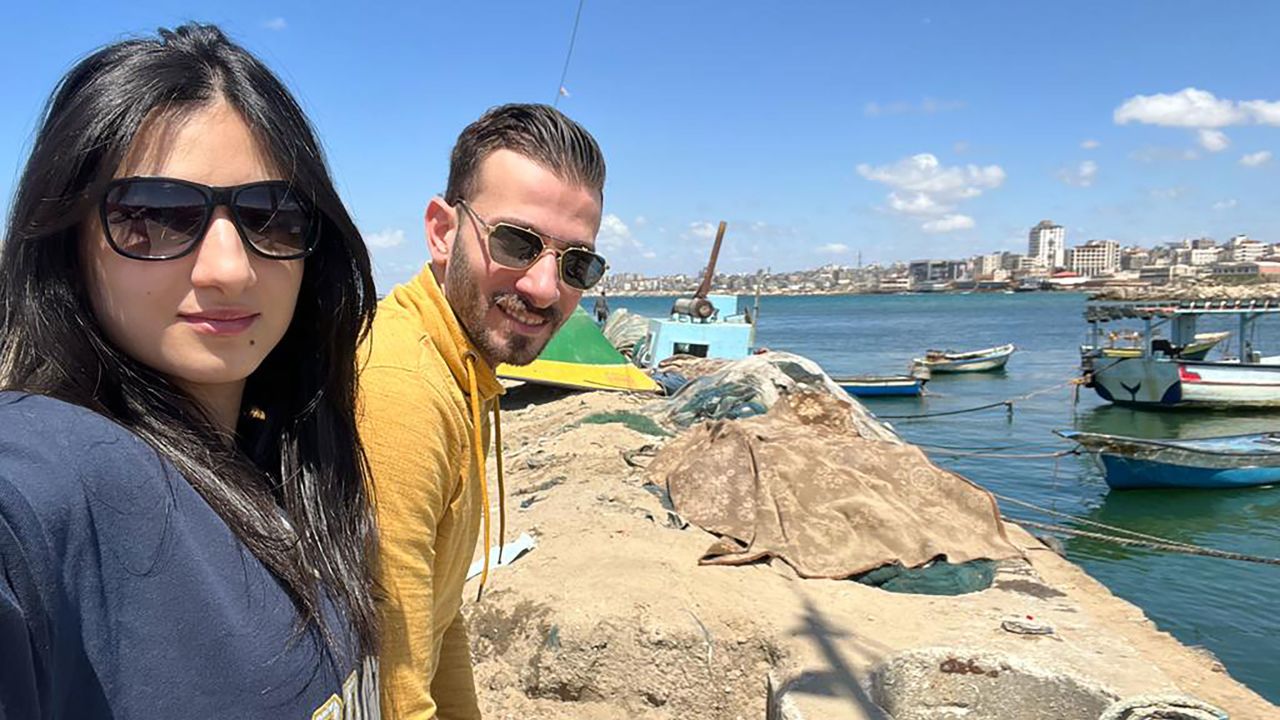
Israel on Sunday said that 500,000 residents are estimated to have left northern Gaza for the south.
Ten members of a single family were killed Monday after an Israeli airstrike hit Al Kizan neighborhood, doctors in the city’s Nasser Hospital told CNN, adding that 23 other people had been injured.
She says she has heard that hospitals in the city are barely operational and medical services are “almost gone” amid a fuel shortage.
The World Health Organization warned last week that the health system in the entire strip is at a breaking point, adding that the impact would be devastating for the most vulnerable patients, including the injured who need lifesaving surgery, patients in intensive care units, and newborns depending on care in incubators.
Allen of the UNFPA said pregnant women in Gaza are “facing unthinkable challenges,” saying the stories he has heard coming out of Gaza’s are “harrowing.”
“Imagine going through that process in those final stages and your last trimester before giving birth, with possible complications, without clothing, without hygiene, support, and not sure about what the next day, next hour, next minute will bring for themselves and for their unborn child,” Allen said.
The United Nations Relief and Works Agency for Palestine Refugees (UNRWA) has warned that Gaza’s humanitarian situation is reaching catastrophic levels, with UN Secretary-General Antonio Guterres warning Sunday that the Middle East was “on the verge of the abyss.”
‘Brink of famine’
Mona Ashour, seven months pregnant, has stayed in the north of the Strip, but not by choice.
Her family doesn’t have the financial means to travel south, she said in messages relayed to CNN by her cousin Hashem Al-Saudi, adding that even if they could travel, the family of four has no one to stay with in the south.
Ashour has reduced her nutrition to the bare minimum as food and water supplies dwindle due to Israel’s blockade. She knows this could be affecting her unborn child, and that’s causing her a lot of stress.
Ashour has two daughters, and the family lives in a house that has a makeshift roof made of tin panels, leaving them exposed to shrapnel from potential Israeli missiles.
“I need a lot of nutritional supplements,” she said, adding that her husband, who used to work on a daily wage before the war, cannot afford them anymore.
The Palestinian Authority’s media office said Monday that Gaza is “on the brink of a real famine as goods in stores are running out, and no aid is coming in,” adding that over half a million people have been displaced in the enclave.
Relief groups and the UN are calling for aid to get into Gaza, some of which has arrived in Egypt’s north Sinai but is yet to cross into Gaza through the Egypt-controlled Rafah crossing.
After meeting the Egyptian president amid a whistle-stop tour of the region, US Secretary of State Antony Blinken said Sunday that the crossing – which is the sole remaining route into or out of Gaza – “will be open.” He didn’t say when.
Over the weekend, concrete slabs were placed at the Egyptian side of the crossing, blocking all gates, a Palestinian border official told CNN Saturday.
On Monday, Egyptian Foreign Minister Sameh Shoukry said there has been no progress in efforts to open the crossing, and blamed Israel for its continued closure.
Khulood, who fled northern Gaza, said she won’t know where to go when it’s time for her to give birth.
“I’m scared. For my son, my unborn child and myself,” she told CNN. “I don’t want to die. I want to see my son grow up… but there’s no life left here. Gaza has become a ghost city.”
Additional reporting by Kareem Khadder, Abeer Salman, Chloe Liu and Niamh Kennedy
Go deeper into the biggest stories and trends in the Middle East and what they mean for your world. Sign up for CNN’s Meanwhile in the Middle East newsletter right here.

